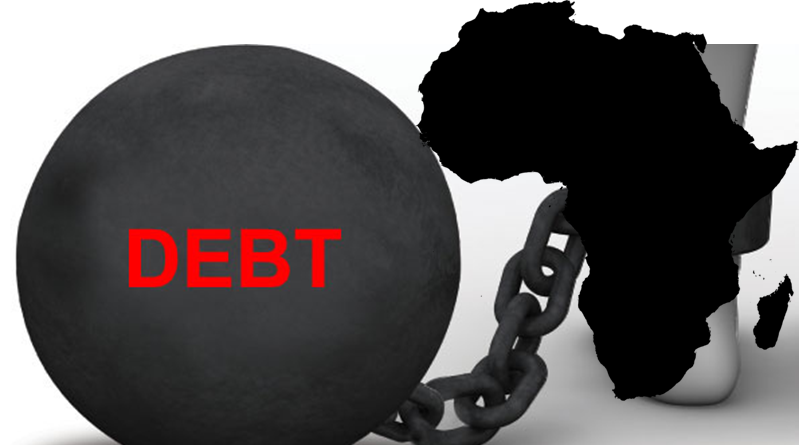Africa’s Debt Crisis Will Worsen If… – Christine Lagarde
Addis Ababa
Addis Ababa is home to the African Union, the UN’s Economic Commission for Africa (UNECA), and is capital city for one of the continent’s fastest-growing economies. But for the duration of its 72-year history no managing director of the International Monetary Fund had ever paid visit to the Ethiopian capital. This changed on Dec. 13 when the fund’s current chief, Christine Lagarde, touched down for a three day visit, touring new industrial parks and meeting with government officials.
Lagarde met with Quartz to discuss some of the challenges facing the continent over the coming years—including the looming threat of another African debt crisis, an alarm she first sounded back in 2014. In the past five years the continent has issued sovereign bonds to a value of $20 billion—most of which will mature in the next few years.
Quartz: Let’s start with the “dark clouds” on the horizon that you made reference to in your speech, and specifically the debt burden. How worried are you about what some have called a ticking “debt bomb”?
Lagarde: I think there are a few things that are important. One is the usual ratio of debt to GDP which in about half of the sub-Saharan African countries now exceeds 50%, or a little less than half. The second thing I think is important is the debt service relative to budget and then for balance of payment purposes it’s the ratio of debt-to-export and debt service to export. So it’s all that taken into account which actually matters, combined with the final indicator which is domestic revenue mobilization. And there are countries in Africa—I’m not going to point fingers at any of them—but some of them are seriously at risk.
Do you think 2018 could be the year that the debt problem finally explodes?
“You can’t borrow your development out of forgiveness programs.” It could very well. You know, what could trigger some very serious developments is actually the improvements in advanced economies. Because if you a see combination of those elements I mentioned, plus the appreciation of some currencies—take the dollar, which has been the currency of issuance for some of those bond issuances that took place over the last few years—and a tightening of monetary policies in the US, maybe in the Euro area, certainly in the UK and one of these days in Japan—and if you combine this all together it will certainly make the burden of debt harder to bear in some of these countries. So I think the debt issue, and the debt service issue, is a concern that we have and a concern I hope some of the policy makers have as well. And I am certain some of the creditor countries are very attentive to that.
Do you think it was too early for some African countries to start issuing sovereign bonds?
I don’t think you can generalize. What I know for sure—because we’ve had programs with some of them—is that the lenders were so eager to lend that I don’t think they were very serious about assessing the risks and assessing their exposure. And there was clearly, on the part of some investors, in the private sector in particular, a drive to push as much debt as possible in order to generate some yield.
Do you think at some point in the near future there will be a need for another round of debt relief? Is this something you can imagine in the next few years?
I don’t think it’s a very healthy prospect to undertake. You can’t borrow your development out of forgiveness programs, one after the other. And a debt operation of that nature is one for the debtors and the creditors to agree, and if you talk to the creditors at the moment there is just no willingness or appetite to actually consider that. And I remember how difficult it has been when it happened first time round.
The IMF released a paper early this year which questioned if Africa will ever develop manufacturing along the model of East Asia. Without manufacturing, what does the future of Africa’s economy look like?
“What happened in Vietnam and Korea over the last 30 years won’t take place in the same fashion in African countries because manufacturing is different.” Again, I don’t think it’s going to be one-size-fits-all. And there are economies which are already moving into adding value to their manufacturing process. When you look at Botswana, you look at Uganda, Rwanda, you look at Benin… those countries already take stock of what they have, try to move up the value chain, add value locally, create employment locally. But in some countries it might well be a rather short process, possibly, and when I look at India for instance and the way in which India is skipping part of the industrialization process to move straight into services… we cannot exclude that in some of the African countries—[they take] that same shortcut from predominantly agricultural economies to more service oriented economies.
Do you think “leapfrogging” to a service-oriented economy can really provide a solution to Africa’s enormous unemployment problem, in particular?
If we look at the manufacturing process that took place in countries like Korea, like Vietnam, to a certain degree in Malaysia as well, we were in days when the use of robotization, artificial intelligence, digital, was certainly not as developed as it is beginning to be now. What took place in Vietnam and Korea over the last thirty years is not going to take place in the same fashion in African countries—because the manufacturing processes are different, and the speed at which transformation needs to take place is more urgent.
Which African countries are positioning themselves best to be able to be something resembling the next Vietnam, the next Korea?
You are necessarily talking about countries that already have developed infrastructure, that already have access to electricity, and that probably have significant manpower. So you are talking about the large countries. Ethiopia comes to mind. Possibly Nigeria, with a big domestic market… some of the coastal countries on the eastern seaboard—Kenya, Tanzania have very large populations and access to the sea. And the availability of a market—or the vicinity of markets around—would be an important criteria.
The first randomized trial of industrial employment on Ethiopian workers seemed to overturn conventional wisdom of the transformative impact of life in factories: two-thirds quit within a year, for reasons like low wages and poor working conditions. How can a country like Ethiopia tackle this problem without relinquishing its key comparative advantage (cheap labour)?
First of all, this process of laborious industrialization and high turnover is relatively frequent. It is not something that is specific to Ethiopia. When there is that rapid shift from a predominantly agricultural economy to a rapidly evolving industrial economy—you see that. It has taken place in other places. Second, in addition to the wages that can be used as an incentive to keep people in the job there is all the ancillary that goes with it. It’s the housing, it’s transportation, it’s access to shops, it’s the ability to have a family life and not be a migrant worker. If you visit the Eastern Industrial Zone here in Ethiopia I think it’s pretty obvious that if you work hard you don’t get a big pay at the end of the month and you probably have to use difficult public transport systems because there doesn’t seem to be much housing available around.
Is there a danger that governments and donors prioritize flashy, high-tech solutions to Africa’s deeply ingrained problems, at the expense of fixing the fundamentals? Is there a risk that when the tech bubble bursts, Africa finds itself with plenty of drones but not enough roads?
“Nigerians—and not just with respect to the IMF—have a tendency to believe that they can address their issues. And if they can, why not? I hope they can.” It could be. It could be. But I would still take the drones even though I can’t drive the car. Because if that drone is going to take some blood sample, take it off for analysis, then take back the remedy that is going to help cure the patient, I’ll take the drone.
But fundamentally it’s going to take some of the major infrastructure to develop in those countries—in order to go beyond a little fix and really develop on a comprehensive basis. So you’re talking about electricity, power, access to water. You’re talking about access to education, you’re talking about health, and you’re talking about transportation. So it’s all of the above, if I may say, irrespective of whether technologies can deliver specific responses to particular problems. Why should it be one or the other?
How is the growth of tech in Africa different from tech in the rich world?
Clearly access to financing is an issue. Because you have startups, but scaling it up requires financing. Availability of infrastructure is another one. Because if you don’t have electricity, if you don’t have broadband, it’s going to be a problem. And third—and this is our shop, because it matters—the macroeconomic framework of a country to actually host entrepreneurs of all sorts, whether they are in the technology field or otherwise.
Let’s talk now about the relationship between the IMF and individual African countries. Nigeria, for one, has had a tenserelationship with the IMF in the past. Why has the IMF been able to get buy-in for its policies in Egypt, say, but not Nigeria? How would you explain that difference?
We actually have a good relationship with Nigeria. They are of the belief that they can conduct their program of reforms without access to financing from the IMF, without the constraints of a program, and if that is the case why shouldn’t they do it that way? We do provide technical assistance, we do help in the banking area—in supervision and in public finance—and I know from having discussed it with her, that the finance minister is absolutely keen and delighted to be able to work with our resident representative in Abuja. So, it’s fine. That’s not an issue. Nigerians, in general, and not just with respect to the IMF, have a tendency to believe that they can address their issues. And if they can, why not? I hope they can.
But that is a country where domestic revenue mobilization is very poor and they have to do a lot of work. If you look at debt service, if you look at DRM numbers… it’s an issue that I hope is high on their radar screen.
What about Ethiopia? That was another relationship that was, certainly fifteen years ago, very tense and there were lots of disagreements. How much has it improved in recent years, and how much do you think the IMF and the Ethiopian government are now on the same page when it comes to certain policy prescriptions?
First of all, we’ve always had a regular relationship with Ethiopia by way of Article IV. We’ve always conducted Articles IV, which is an IMF membership trade-off, in a way, and that has always been observed by Ethiopia. I think the country has adopted a slightly specific model of development, relying heavily on state-owned enterprises, intervention by the state, and a strong component of planned development from the centre. And that was ‘phase one’ of development—which has had its benefits. If you look at poverty reduction, growth rates in general, reduced inequality and better distribution across the board—certainly the performance has been good. According to what the policy makers tell us, they are now moving into a second phase of development, where there is a clear determination to open up to the private sector, to make sure the private sector takes the baton from the public sector, and which will probably be based on public-private-partnerships—even in the case of infrastructure—than pure government-led, government-financed, government-determined infrastructure projects. And you know, any development model, if it works, is to be commended. And them moving to second phase of development perhaps brings us closer maybe to them in terms of perspective.
And broadly speaking, is that kind of active industrial policy that they’ve pursued, is that something that other African countries can learn from?
You know, when I listen to African leaders around the continent, many of them praise somebody like Paul Kagame of Rwanda, as one example of inspiring development. That’s slightly different. Many others refer to Kenya, particularly when it comes to the penetration of new technologies and access to financing. So I think that there is not one single model, and to assume that infrastructure is going to develop simply because public sector investment is going to deliver would be a very one-sided view of how development can occur.
Is the fund more ideologically flexible than it was, say, 20 years ago?
I don’t know about the past. What I’m interested in is what works, what is making sense for people, and how we can restore macroeconomic stability so that in the medium term, investment—be it combined public and private or predominantly private—and open markets, can provide the productivity, the innovation, that is conducive to higher incomes and the ability to distribute across the aboard.
By: Tom Gardner, Quartz Africa
Tom Gardner is a British journalist based in Addis Ababa. He writes for The Economist, and covers land rights and urbanisation for the Thomson Reuters Foundation. Follow him @TomGardner18.
Source: https://qz.com/1159245/imfs-christine-lagarde-says-africas-debt-burden-could-get-worse-if-us-dollar-and-euro-strengthens/?mc_cid=5eabfc8e66&mc_eid=6194504adb




